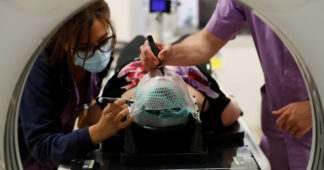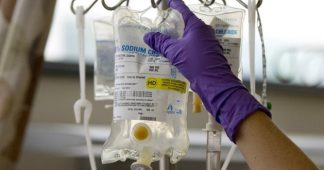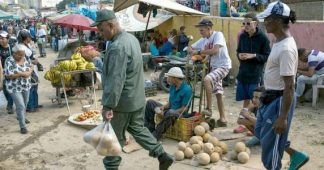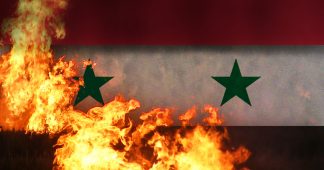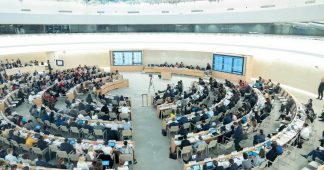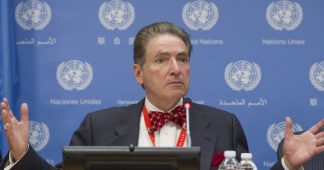GENEVA (21 July 2021) – Hundreds of Venezuelan cancer patients could die because they have been caught up in excessively strict application of U.S. sanctions aimed at Venezuela and the state-owned oil company Petroleum of Venezuela (PDVSA), independent experts* appointed by the Human Rights Council said today.
“The lives of Venezuelan transplant patients who are stranded in foreign countries, as well as those waiting to travel abroad for live-saving operations are under threat,” the experts said. “A trip abroad for treatment has become the only hope for hundreds of critically ill patients.”
According to experts on the matter, “this issue has been brought to the attention of the Government of the United States of America, other countries and entities.” They have also called on these countries and entities “to mitigate the unexpected consequences of sanctions, and reinstate treatment for people whose lives now are in danger. They must take full responsibility for the effect their actions have on the fundamental rights to life and health of every individual around the world.”
Third countries, groups of countries, banks and private companies have been overly cautious in dealings with Venezuela because they fear unintentionally violating U.S. sanctions, the UN experts said. As a consequence, money cannot be transferred out of Venezuela, and some patients have been stranded, destitute, in countries where they went for treatment.
At issue is a programme run by the Simon Bolivar Foundation, the charitable arm of the United States-based Citgo Petroleum Corporation, which helped cancer patients, including many children, travel abroad for transplants and for other live-saving treatment. Hundreds of these patients used to be linked to a national transplant programme with the Government of Venezuela, but their treatment was discontinued when the United States refused the control of Citgo Petroleum Corporation to the Venezuelan government.
“Targeting PDVSA as a way to control the political agenda of Venezuela has had devastating consequences for hundreds of people undergoing treatment for transplant rejection, both in Venezuela and abroad,” the experts said. “People on a State waiting list for transplants have also been informed that their treatments will not continue.”
There are some 190 cancer patients on a waiting list for foreign treatment, and some 14 children, including three toddlers, died between 2017 and 2020 waiting for treatment under the programme.
These cases illustrate the need for full protection of fundamental human rights, the experts said: “States have an obligation to respect, protect and fulfil the human rights of every person affected by direct international action, even those outside their jurisdiction or effective control, no matter what their original intent was.
“While the right to health and the right to life are fundamental for every individual around the world, we call on all States, banks and private companies to take full responsibility for the effects of their actions on individuals, and to withdraw sanctions, zero risk and over compliance policies affecting core human rights”.
*The experts: Ms. Alena Douhan, UN Special Rapporteur on the negative impact of the unilateral coercive measures on the enjoyment of human rights; Mr. Nils Melzer, Special Rapporteur on torture and other cruel, inhuman or degrading treatment or punishment; Mr. Obiora Okafor; Independent Expert on human rights and international solidarity;Mr. Livingstone Sewanyana; Independent Expert on the promotion of a democratic and equitable international order; Mr. Saad Alfarargi Special Rapporteur on the right to development; Ms. Tlaleng Mofokeng Special Rapporteur on the right of everyone to the enjoyment of the highest attainable standard of physical and mental health.
The Special Rapporteurs and Working Groups are part of what is known as the Special Procedures of the Human Rights Council. Special Procedures, the largest body of independent experts in the UN Human Rights system, is the general name of the Council’s independent fact-finding and monitoring mechanisms that address either specific country situations or thematic issues in all parts of the world. Special Procedures experts work on a voluntary basis; they are not UN staff and do not receive a salary for their work. They are independent from any government or organization and serve in their individual capacity.
All communications, including those mentioned in this Press Release are available on the website of the OHCHR at https://spcommreports.ohchr.org/
Published at www.ohchr.org
We remind our readers that publication of articles on our site does not mean that we agree with what is written. Our policy is to publish anything which we consider of interest, so as to assist our readers in forming their opinions. Sometimes we even publish articles with which we totally disagree, since we believe it is important for our readers to be informed on as wide a spectrum of views as possible.
